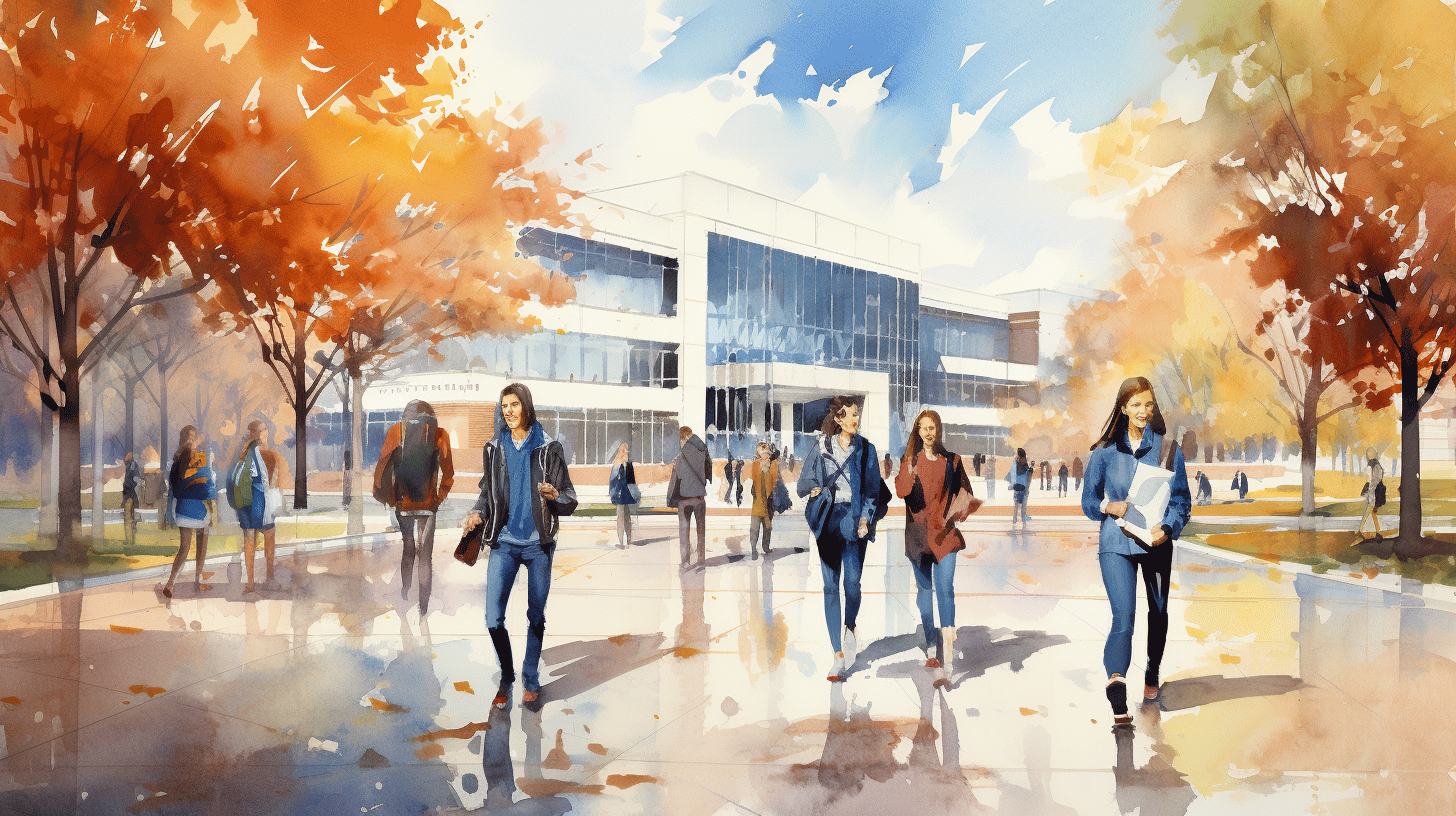You might feel invincible stepping onto campus for the first time or even at the start of a new academic year. The sense of freedom, the vibrant energy of fellow students, the chance to explore new horizons; it can all be wonderfully overwhelming. Before you get swept away, there's something vital we need to consider, something that forms the foundation of all these exhilarating experiences - safety.
While college campuses are designed to enhance your learning experience and nurture your talents, ensuring you're safe and secure is just as essential. You may ask, why is it so important? The answer lies in the fact that a safe and secure environment allows for the peace of mind that fosters growth and creativity.
Now, let's venture together into the essential strategies for promoting personal safety on campus. Our focus is to help you become knowledgeable and prepare you for a safer college life. After all, a safe student is a successful student!
Overview of Campus Safety Statistics
College life, as exciting as it is, also brings with it certain vulnerabilities. Unfortunately, we now find ourselves in a landscape where the safety of learners is an increasing concern. Why is it so? If we look at the figures from the national crime reports, we see that in 2021 alone, over 31,000 crimes were reported on US college campuses.
National Campus Crime Reports
These crimes range from theft, burglary, and assault to much graver offenses. Such incidents not only contribute to the disruption of academic pursuits but also make us question the safeguards in place. A large number of these cases could have been prevented with the right security apparatus or simply by following some of our compiled Best Practices for College Students for personal safety on campus.
Student Stalking Reports
Now, let's talk about a widespread yet often overlooked problem - stalking on campus. This form of harassment creates a significant toll on an individual's psychological health. It might shock some of us, but surveys reveal that somewhere between 6% to 39% of college students report being stalked since entering college. Isn't that alarming?
In tackling this menace, it's essential to keep the conversation ongoing, raise awareness, and provide students with strategies for self-defense and reporting mechanisms. Not only does this empower them to protect themselves, but it prompts them to look out for their peers, creating a tightening web of safety and vigilance.
We're not sharing these figures to alarm you, but to inspire awareness and action. It's a call for students, staff, university administrations, and the larger community to take campus safety seriously. After all, securing the learning environment isn't just about making college a safer place; it's about making our future a safer place.
Safety Measures in Colleges
Feeling safe is an essential part of success in college, and it's a responsibility that colleges across the globe take to heart. A secure environment encourages peaceful co-existence, leading to a focus on academic success and social involvement. Most colleges have made substantial strides in improving the safety of their students and staff, with measures such as the presence of security officers, physical security upgrades, and the proactive provision of emergency contact information.
Presence of Security Officers
Nothing gives a sense of security more than a physical deterrent, and that's where dedicated security officers come in. On campuses large and small, college administration pledges to keep students safe in their environment, leading to a significant presence of security officers.
Just to give you an idea – approximately 90% of colleges with an enrollment of 16,000 or more students have at least one security officer for every 1,000 students. Looking at such figures, it's evident colleges are putting a priority on the safety of their students. These security officers play an essential role in fostering a safe and secure atmosphere, working round the clock to prevent, respond to, and manage potential security problems.
Physical Security Upgrades
In addition to the presence of security officers, colleges have incorporated various physical security upgrades into their campuses. These measures range from installing surveillance cameras and motion detectors, secure gated entrances and exits to improve access control, to state-of-the-art alarm systems and improved outdoor lighting.
Additionally, many colleges have embraced technology and installed apps that allow students to send discrete safety alerts when feeling threatened. These improvements have not only helped colleges monitor and manage their safety but have also significantly reduced crime rates within college campuses.
Emergency Contact Information
Another thoughtful measure that colleges have employed is the provision of emergency contact information to all students and staff members. No one ever anticipates being in an emergency situation, but being prepared can be a life-saver.
This information generally includes contacts for campus safety officers, local police, fire, and medical help, and other essential resources. It's typically available on the college's website, app, and sometimes in print around the campus. This readily available information empowers everyone on the campus to act quickly and effectively in case of an emergency.
By investing in safety measures like these, colleges demonstrate that they truly value their students and staff. Through ongoing efforts, they continue to foster an environment where everybody can focus on what matters most - learning, growing, and becoming future leaders.
Safety Rights and Legal Compliance
As your trusted guides through the terrain of higher education, we believe it's important to shed light on the critical aspects of College Safety Rights and Legal Compliance. This topic not only affects our peace of mind as students, faculty, or staff but also has significant implications for the institutions we are connected with. If you thought crossing the stage on graduation day was the most important event during college, think again. Let's delve into this pressing matter and arm ourselves with essential knowledge regarding the Clery Act and the fines imposed by the Department of Education for non-compliance.
The Clery Act
The Clery Act is an underrated but crucial component of a college's legal obligations. Requiring colleges to publish annual reports disclosing campus security policies and crime statistics, it brings transparency to the forefront. This information is key to making informed decisions as prospective students, concerned parents, or dedicated college employees. The true beauty of the Clery Act lies not just in its demand for disclosure but also in its commitment to victims' rights. Particularly, it assures that campus sexual assault victims are granted certain essential rights. Thus, we become active participants in maintaining safer campuses by understanding and actively leveraging the Clery Act.
Fines for Non-compliance by the Department of Education
While the details of the Clery Act may seem overwhelming, it's important to note that colleges can't afford to take it lightly. The Department of Education is stringent about compliance. Falling short of these obligations can invite hefty fines. Therefore, schools must be vigilant about adhering to the Clery Act or run the risk of financial penalties. It isn't just about the monetary implications; it's about creating an environment that's safe and supportive for everyone involved.
Given the substantial implications and the essence of transparency the Clery Act upholds, we need to ensure our colleges aren't just degree factories but sanctuaries where we learn, grow, and feel secure. Knowing the risk of non-compliance, let's hope the institutions we treasure understand the importance of adhering to safety rights and legal compliance, for all our sakes. After all, when it comes to our safety and the environment in our colleges, it's not just about compliance—it's about care.
Safety Precautions for Students
Heading into college can be a thrilling adventure, full of exciting possibilities, newfound freedom, and the opportunity to make lasting friendships. Yet for all its enticing prospects, it's equally essential to navigate this unchartered territory with a keen eye on safety. The good news is, by adopting several precautionary measures, our students can ensure they keep danger at bay while still having the time of their lives. Let's dive into some strategic safety tips starting with the aspect of meeting new people and the importance of good judgment.
Meeting New People
One of the best things about being in school is meeting diverse individuals from different walks of life. However, while broadening our horizons, it's imperative to do so safely.
- Keeping Information Private: As intriguing as it can be to share your life stories with others, it's advised to keep personal and sensitive data private, especially when meeting new people. Information like your address, class schedule, and financial details should be closely guarded.
- Public Meet-ups: Always propose meeting new acquaintances in public places during the daytime and let a trusted friend or family member know about your plans.
- Respecting Your Comfort Zone: Never be pressured into attending gatherings or situations where you're uncomfortable. Remember, it's okay to say no and prioritize your safety.
The Importance of Good Judgment
It's frequently said that college isn't merely about textbook knowledge; it's essentially about life lessons, a critical part of which is cultivating good judgment.
- Trust Your Gut: If something or someone seems off, they probably are. Trusting your instincts is a powerful tool in avoiding potentially dangerous situations.
- Alcohol Awareness: While partaking in social events, be aware of your alcohol intake. Always know what you're drinking, never leave your drink unattended, and avoid accepting drinks from strangers.
- Buddy System: There’s safety in numbers; always travel in groups, especially during late hours.
By keeping these Practical Tips for Students in mind, school can be a more secure and enjoyable experience. We can't control everything that happens around us, but we certainly can control our actions. It's essential to remember - safety always comes first. Whichever way you choose to enjoy your college life, make safety your top priority, after all, only when we're safe can we truly relish the experiences that lie ahead of us.
Importance of Safety Education for Parents
As parents, the safety and well-being of our children remains a topmost priority. But, how do we equip our little ones with the knowledge and skills they need to navigate life's dangers and unexpected situations confidently? The answer lies fundamentally in imparting quality safety education at home. With the right approach and information, the benefits are priceless, leading to a safer, more informed family environment.
Firstly, it's important to address the elephant in the room - the role that we, as parents, play in our children's safety education. It's a responsibility that's as imperative as it is impactful, and often, understated. One might ask, "Why is it crucial for parents to be involved in safety education for their kids?" Well, the truth is simple and compelling:
- Children learn more from home: Parents are usually the first teachers for their children. Kids are more likely to adopt and follow what they see at home. It's our actions and words that shape their perspectives and behavioral habits.
- Parents can provide real-life context: By teaching children about safety measures and precautions, parents can provide realistic examples from everyday life, making it easier for children to understand the importance of safety.
- Strengthening Family Bonds: The process of learning about safety together can also contribute to a stronger bond between family members while ensuring each loved one's well-being.
"What steps can we take to incorporate safety education effectively?" is a question that many parents grapple with. It starts with having open, age-appropriate discussions around various safety topics. Whether it's the importance of wearing a seatbelt while driving, identifying potential hazards at home or school, or even talking about cyber safety, no topic is too insignificant when it comes to ensuring our loved ones' safety.
Our Family Safety Measures article provides more detailed strategies and information on educating our children effectively about dangers and safety precautions.
Parents, without a doubt, hold a significant and powerful role in reinforcing the importance of safety. We are our children's first line of defense. Through safety education, we can arm our little ones with knowledge, instill in them good habits, and enable them to face uncertainties confidently, thus paving the way for a safer tomorrow. All it takes is commitment, patience, and understanding to foster a safe and secure environment for our family. After all, there's no greater joy than knowing our children are safe and armed with the right knowledge to make smart safety decisions.
Residence Hall Safety Tips
We've all heard the phrase "safety first," and while this is true everywhere, it's incredibly pertinent when it comes to your place of residence. The world of residential halls can be a thrilling place teeming with newfound independence and various ideas. However, amid the excitement and the amiable sense of camaraderie often lies the overlooked subject of safety. Here, we attempt to highlight some crucial safety norms. By adhering to these, you can ensure that your residential experience doesn't just brim with adventure, but also with the peace that comes from assuring your safety and that of others around you.
Keeping Doors Locked
Akin to buckling up as soon as you enter a car, locking doors should ideally be the first thing you do as you pop into your residence hall. Regardless of whether you're inside or going out, always ensure that your doors are securely locked. This handy habit can immensely reduce the chances of theft, unwelcome visitors, and thus, unwanted predicaments. Remember, it's better to be safe than sorry.
Safeguarding Valuables
As much as we may trust our peers, it's essential to remember that carelessness can be an invitation to crime. Take a moment to evaluate the items that hold substantial value—be it monetary or emotional—and take proper care to secure them. You could opt for a small locker or a safe; the point is to keep your valuables out of sight and out of easy reach. Remember that safeguarding valuables isn't an indication of suspicion or secrecy, but a wise step towards precluding potential issues down the road.
Reporting Suspicious Activities
No one desires to enter the nebulous zone of 'what-ifs', but sometimes it becomes necessary. Always be aware of your surroundings and be cautious of activities that seem out of place or suspicious. If you happen to notice such activity, don't hesitate to report it to the concerned authorities. Doing so not only ensures a safer environment for yourself but also aids in maintaining the safety of your peers.
These tips merely form the initial stepping stones towards safety. For a more in-depth look, consider reading our Must-follow Safety Guidelines to gain a comprehensive perspective on campus safety norms. Remember, safety awareness and proactive measures can equip us with the armor we need against unpredictable mishaps. By integrating these simple yet effective steps into our routine, we can contribute to creating a secure and harmonious residence hall experience for everyone.
Safety Enhancements for Institutions
In the ever-evolving landscape of academic institutions, the focus on safety can never be sidelined. Not only for the purpose of adherence to government regulations, but more importantly, to ensure the wellbeing of every student, staff, and visitor within the premises. This article delves into various safety improvement measures for schools, universities, and other institutions alike. We prioritize the much-needed steps to create safer, more secure environments conducive to learning and intellectual development.
Safety Audits and Risk Assessments
Conducting periodic safety audits and risk assessments are a paramount first step in revealing potential safety hazards. These comprehensive analyses examine everything from structural safety to electrical systems, potential fire threats, and sanitation facilities. They serve to identify potential weak spots that need rectifying as soon as possible to minimize any health and safety risks.
Emergency Plans and Drills
Having well-planned reactions to potential emergency situations can be life-saving. These include evacuation plans in case of fire or building security breaches, on-campus police response procedures for incidents of violence, and lockdown protocols for potential threats within the institution itself. Regular drills should be conducted, ensuring everyone understands their role and the steps to be taken during these moments of crises. Please don't overlook the importance of a calm and measured response during emergencies, a key aspect that can be facilitated by familiar drill practices.
Implementation of Tech Solutions for Safety
In an era marked by rapid advancements in technology, institutions have an array of safety enhancements at their disposal. Surveillance cameras, alarm systems, access control measures, and other digital tools can drastically enhance security and discourage potential threats. At the same time, well-maintained traditional safety measures like good lighting, secure locks and windows, secure bike racks, and emergency call boxes have their place and should not be overlooked.
As we discuss these measures, it is only right to extends the focus beyond just physical safety aspects. In our post, "Enhancing Personal Safety Strategies", we explore strategies regarding personal safety of students and staff while on campus; This equally important facet, on ensuring emotional and intellectual safety, merits just as much attention.
In our quest for more secure learning spaces, it is our collective responsibility to identify, address, and continue to improve safety measures in our institutions. No safety enhancement effort is too small. Each initiative contributes to a safer, conducive learning and work environment where everyone is empowered. The beautiful by-product of investing in safety is peace of mind - let's ensure that everyone under our institutional umbrella enjoys that privilege.
Campus Safety Apps
Living in a connected world, we always have tools at our fingertips to help deal with various aspects of modern life - including safety. This is just as applicable to the campus environment as it is anywhere else. As we navigate the shifting currents of digitalization, we've come to discover that campus safety apps represent a worthwhile option for students, parents, teachers, and staff alike to give peace of mind.
Each of these apps serves the purpose of bridging the gap between campus community members and safety departments. They offer a variety of features, from emergency notifications to GPS location tracking. One such gem among these safety apps is the Rave Guardian App.
Rave Guardian App
The Rave Guardian App stands to be true to its name - like a silhouetted guardian always watching over you. If you've ever wondered about personal safety on and off campus, this app becomes your digital partner in crime prevention and personal well-being.
- Virtual Safety Escort: The app provides a virtual safety escort. Share your live location with campus security, friends, or family when you're walking alone, especially during late-night hours.
- Emergency Calls and Messaging: With a press of a button, it connects you to campus security or the nearest 911 center.
- Timed Safety Session: Set a safety timer notifying a chosen guardian about your journey. If the timer expires without being deactivated by you, your guardian receives an alert.
What makes this app admirable is its commitment to privacy. Your location is shared only when you choose to share it. A direct bridge to immediate help, the app keeps conversations confidential too, further underscoring its role as a reliable safety tool.
"Safety takes no holiday," so goes a famous adage. In a landscape where students are balancing the excitement of independence with good judgment about personal safety, the Rave Guardian App serves as a tool that never calls in sick.
Even without the 'cloak-and-dagger' part, personal safety remains essential. In this digital era, the Rave Guardian App is a potentially vital aspect in the arsenal of campus safety and we're proud to share how accessible and unbeatable security can be. The world may be unpredictable, yet one thing remains certain - safety is always a priority. It's within your grasp today - are you ready to seize it?
High Standards for Campus Safety Departments
When it comes to the tranquility and personal well-being of our students, there are no compromises. We believe firmly in the responsibility of maintaining a safe and secure environment on our college campuses. Isn't it comforting to know that the places where the leaders of the future spend such important years of their lives are backed by robust campus safety departments? Consequently, it isn't a stroke of luck, but rather high standards that we diligently set.
The bedrock of an effective campus safety department starts with dedicated personnel. We're talking, of course, about skilled professionals who bring their expertise and dedication to their roles each day. They're equipped with the most recent training and the right tools to respond to any incident that arises - from assisting that freshman who's locked out of his room, right up to coordinating responses to major emergencies.
Our focus isn't just on reaction, but on preventing incidents from ever occurring. Thus, an effective safety department invests in detailed risk assessment and prevention measures. These include:
- Regular safety audits: We always aim to identify potential hazards before they become real issues.
- Safe walk programs: No student should feel insecure walking alone on campus at night.
- Shuttle services: Designed to transport those who don't feel safe walking from one side of campus to the other.
- Security awareness programs: Because knowledge is power, and an informed community is a safer community.
While implementing the above measures, there is also a keen interest in the integration of modern technology into our safety landscape. Top-tier safety departments incorporate the cutting-edge technology that can bolster the efficiency and effectiveness of their protocols. This includes comprehensive surveillance camera systems that allow for real-time monitoring of campus.
Bear with us for a moment, and imagine a campus where open channels of communication are prioritized. A campus where students, faculty, staff, and security personnel are all on the same page; that's what we strive for. That's why consistent communication is invaluable. Whether through social media, email bulletins, or a specialized app, alerting students to safety issues and updates helps to foster a sense of shared responsibility for campus security.
By championing these high standards for campus safety departments, we contribute to delivering an enriched, wholesome college experience to our students. Remember, a campus that feels safe is a campus that allows students to focus on why they are truly there - to learn, achieve, and flourish. Together, let's make the safety of our campuses a real point of pride. Practical measures meet high standards, and that is a winning combination!
Conclusion
At Empowered by Ashley, we understand that a sense of personal safety is crucial for every student on campus. That's why we stand with you in promoting awareness, fostering education, and encouraging the adoption of comprehensive safety measures. By leveraging our curated selection of personal safety products like safety alarms and drink cover scrunchies, you can add an extra layer of protection to your daily routine.
As always, remember that ensuring safety on campus calls for a collective effort from all stakeholders – administration, parents, and students alike. Remember, staying safe isn't just about the alarms you carry or the apps you have on your phone - it's also about the choices you make, the people you trust, and your determination to hold your institution accountable.
Through it all, Empowered by Ashley will continue to join you in championing personal safety, empowerment, and well-being. With a good dash of caution and a spoonful of courage, together we can make every campus a safe haven for students. Visit us at Empowered by Ashley to explore high-quality, reliable, and innovative safety products for both individuals and pets. Stand tall, stay empowered, and let's create safer campuses together!
Frequently Asked Questions
-
Why is promoting personal safety on campus important?
Promoting personal safety on campus is important to ensure the well-being and security of students. It helps create a safe environment where students can focus on their studies without feeling concerned about their safety.
-
What are some essential strategies for promoting personal safety on campus?
Some essential strategies for promoting personal safety on campus include: 1. Walking in groups or using campus escort services at night, 2. Being aware of surroundings and reporting any suspicious activities, 3. Locking doors and windows, 4. Utilizing well-lit pathways and avoiding isolated areas, and 5. Learning self-defense techniques.
-
Are there any safety measures students can take in their dorm rooms?
Yes, students can take several safety measures in their dorm rooms such as: 1. Keeping doors and windows locked, 2. Not letting strangers into the building, 3. Installing a peephole or a security camera, 4. Reporting any faulty locks or security issues to the resident advisor or campus security, and 5. Being cautious with sharing personal information or codes to access the building.
-
How can students stay safe when using public transportation to and from campus?
To stay safe when using public transportation, students can: 1. Be aware of their surroundings, 2. Wait for transportation in well-lit areas, 3. Sit near the driver or in crowded areas, 4. Avoid displaying expensive belongings, and 5. Trust their instincts and get off the vehicle if they feel uncomfortable or threatened.
-
What should students do in case of an emergency on campus?
In case of an emergency on campus, students should: 1. Stay calm and follow the instructions of campus authorities, 2. Use emergency call boxes or campus safety apps to report the situation, 3. Seek a safe location and stay there until given the all-clear, and 4. Stay informed by checking official communication channels like text alerts or the campus website for updates.




















Leave a comment
This site is protected by hCaptcha and the hCaptcha Privacy Policy and Terms of Service apply.